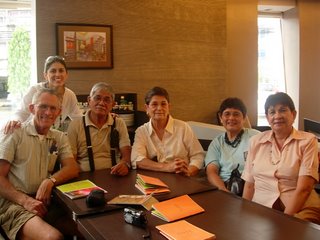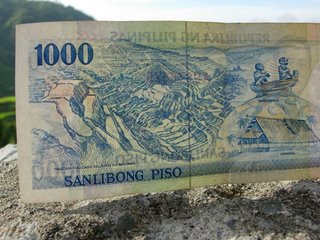 A picture of the 1,000 peso bill, which shows an image of our destination: 2,000-year-old rice terraces in Banaue Village, Mountain Province, Luzon Island, the Philippines.
A picture of the 1,000 peso bill, which shows an image of our destination: 2,000-year-old rice terraces in Banaue Village, Mountain Province, Luzon Island, the Philippines. The following is our longest blog to date about the three-day overland drive that Mom ("H"), Dad ("B") and I ("AM") took from Manila to a mountain village called Banaue on the first day (9 hours); then to Sagada on the second day (6 hours); and finally to Baguio (8 hours) on the third day. The drive was treacherous, tedious, sweltering, bumpy, rocky, and slow. Time crept by in our van by the millionth of the second. We spent so many hours travelling slowly over dusty, rocky roads up in the mountain provinces of the Philippines that I thought I should eventually try to write a short excerpt here on my blog attempting to convey the slow, painstaking tedia of the whole experience. To put it mildly, Mom, Dad and I were pretty miserable, especially by the third day. The following are my notes of our dialogue about the experience after having a day of rest here in Baguio City. Fortunately, we were able to talk humorously about this hellish experience - truly an experience of a lifetime, which none of us ever hopes to repeat.
AM: Okay, so we took our flight (from Bacolod) to Manila.
H: We were met by our tour guide and started our long long long lonnnnnnnnnnng, rocky, drive to Banaue. Did we see the rice fields that day?
AM: No…the second day. Remember when we got there we had those massages. Tell me about that.
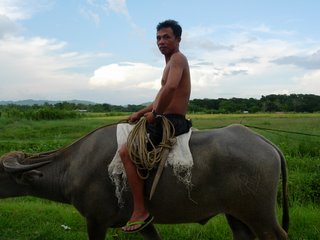 A common scene from the window of our van: Filipino man riding his carabou
A common scene from the window of our van: Filipino man riding his carabou H: We stayed in a fairly nice lodge where we had our massages. It was my very first massage. I didn’t realize that I had muscles that she worked on. Let’s see. She pushed and pulled and pushed and pulled on every muscle in my fingers, my toenails (AM: laughing at Mom) my ears… my chin, my neck (Mom is gesturing to each part of her body as she lists them.)
What else? (Mom pauses and looks at me with a questioning face.) It hurt, but at the same time it felt good. It only cost six dollars for a whole hour of pain but yet relaxation! For six dollars an hour, it was well worth it. But I don’t think I am going to pay $40 or $50 for another one in the United States. Maybe I’ll wait ‘til I go to Russia. Maybe they’ll have a massage in Russia for the same price.
AM: I’m going to write here later why I thought we needed the massages so badly.
H: Well, we sat in the car, and the road was rocky. I mean it wasn’t a dirt road; it was ROCKY! It was an unpaved road. It was a rocky road. They had large rocks that the car had to go on. And our vehicle didn’t have a good suspension (system). Ann Marie kept telling me to move over.
(H is smiling mischievously. She makes AM laugh loudly)
H: Cause I was sliding onto her all of the time! She was being squashed (both laughing) by me and Bernie. [Note: I was sitting in the middle, between Mom and Dad.]
 The long, winding, never-ending road - 10 miles per hour - hour after hour.
The long, winding, never-ending road - 10 miles per hour - hour after hour.AM: I think I’m gonna have tears in my eyes right now (laughing so hard)… So how many hours was that trip?
[Bernie, my dad, joins the conversation] B: Well I think we drove nine hours elapsed the first day, then 6 the second day, and then 8 the last day.
AM: I know. It was a truly painful experience.
H: But we finally saw the terraces. And Bernie commented that “wasn’t the long trip worth it?”
B: What?
H: (Re-explaining.) You were in so much awe of the rice terraces that you said the trip was worth it!
B: Yeah… I think it was worth it.
H: I guess after the fact it was.
B: It was pretty impressive. I learned that terraces are not only used for rice but for other vegetables in other areas.
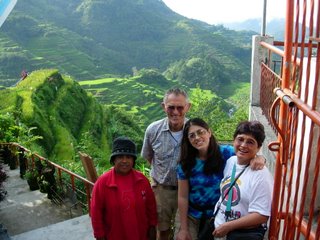 Mom, Dad, me, and our local guide, Helen at Banaue Terraces
Mom, Dad, me, and our local guide, Helen at Banaue Terraces AM: I know when I had the massage I said then it was worth it to, but you (Mom) responded that you “wouldn’t go that far”
(long pause) Okay, tell us about the health of everyone.
H: I have a cold I can’t get rid of. I’m taking so many medications that Ann Marie thought that I was dead last night!
[AM laughs hard. B even looks up with a small wry smile.]
H: Because I was finally able to sleep and didn’t cough and didn’t make a sound.
AM: That was last night, right?! Yeah, I was worried that you were mixing your medicines. And I hadn’t heard from you all night. Unlike the previous nights when you were coughing up a storm.
H: But we’re skipping some days. (pause). The old lady who showed us the terraces. I gave her a big tip, I think she was very surprised. I should have given her 100 pesos, but I gave 300. Our other guide (Jerry, our driver) was surprised I gave her so much money. I should have given her 50 pesos. (pause) I gave her 300 pesos can you imagine that?
AM: I think that’s great. It’s only $6.
H: Yeah, but for a tip, that’s pretty good.
 Mom holds some blades of rice on the terraces
Mom holds some blades of rice on the terracesAM: Okay, well what did she do with us?
H: She took us to several terraces and walked us through the terraces. She guided us very carefully so we wouldn’t slip and slide. And she took us up to the mountains to see an old house. An old native hut. With … (pause)
[B exits]
H: We met a very old lady who was helped by a young boy (to walk) to a viewpoint. Where a house had just burned down a couple of weeks ago. She was dressed in her native clothes. And gladly posed for pictures.
AM: I thought it was amazing that she was so old. She said that she had been
a young lady already during World War II.
H: That’s right.
[B comes back.]
AM: Hey Dad, what were your impressions of that lady we saw in native dress?
B: Oh my! (He laughs)
H: She was a character wasn’t she?
B: Yeah, it was amazing that she was still operating at 100 years old.
H: Very thin. Very frail.
B: She was getting right down on her haunches. She was very friendly. I’m not sure how much Enlgish she has… but she had a very friendly manner.
 A local lady poses in native dress. We estimate she is about 100 years of age
A local lady poses in native dress. We estimate she is about 100 years of age
H: Now we learned from Belay (our other tour guide, Jerry’s wife) – no, it was another guy who told us. We learned that old people depend on their children for support. The government doesn’t have any benefits. Maybe that it is why they have so many children. See the government doesn’t give them anything.
(Mom bursts into a round a coughing)
AM: Okay, what else is very memorable about that trip?
H: The second night we slept in a –what do you call it – a boy scout cabin. (Asking Dad) What did you think of that cabin?
B: Oh! (small laugh) It was very minimal.
H: I don’t think they had mattresses did they? But we were so tired.
B: It was just barely enough to get buy. It was protection from the rain. But it was very rudimentary. Of course, you (looking at AM) took a shower. It looked nearly impossible to me to clean up. They didn’t give us any towels, and the pillows were not adequate.
H: I guess we don’t know how to rough it.
B: It had light … electricity. It had water. It had a flush toilet.
H: That’s one interesting thing about toilets. Every time you go to the bathroom you have to flush it down with a bucket of water that was collected.
B: Yeah, wasn’t that interesting? Very common. Sometimes (the bucket was) auxiliary. But…
H: But the ride to Baguio was rainy. The roads were rocky and windy and steep!! Dad was surprised that I didn’t get motion sickness like I normally do. But I don’t know why I didn’t get motion sickness like I normally do.
Don’t know why. I guess I was blessed. Can you imagine if I had gotten motion sickness and Jerry (our driver) would have had to stop every thirty mintues?! I guess I was blessed on this trip.
AM: Yep, that is a very glass-is-half-full way to look at things. Considering how strenuous the trip was.
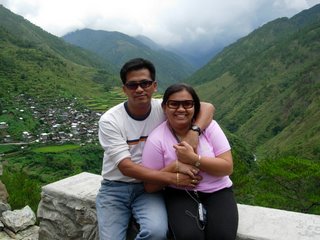 Our driver, Jerry, and his wife, our guide, Belay
Our driver, Jerry, and his wife, our guide, BelayH: Yeah, that is really amazing how I didn’t get car sick. Huh Bernie?
B: Yeah. I thought it was amazing that you would be willing to ride on such a road. But I guess you didn’t have a choice. You wouldn’t let me drive on such a road back at home. You won’t even let me drive on two-lane roads.
H: Yeah, I would have demanded to drive. Yeah, I usually drive to Snowshoe (Mom and Dad's favorite vacation spot in West Virginia) because of the little winding roads.
B: She would rather go on the interstate rather than on two-lane roads. Sometimes I like to go on a back road.
H: I would rather go on the freeway than a two-lane road. (She says with disdain)
AM: Okay what else about the trip?
H: Well Jerry was very conscience about our needing to go to the bathroom.
B: Yeah.
H: So, he made sure to check the bathrooms before we went. Sometimes he skipped several places because it seemed unsanitary.
B: I wonder how many times those two have made the trips.
H: She says they have done the trip several times.
B: It seems if he’s done it several times, he should probably know where all the clean bathrooms are.
H: I don’t think he’s ever had people who have to go to the bathroom as much as you two did. (AM laughing a lot now). I mean you two… ! I mean, they didn’ t go to the bathroom half as much as you two did. (long pause)
H: (Continues) Thank goodness for my sleeping pills and Nyquil. It helped me with my sleep
AM: That’s why I started to worry if you were dead.
H: Yeah, because I took sleeping pills, and that medication she gave me
AM: And Nyquil.
H: Now I have my antibiotics. So now I’m taking (that too)!
AM: Okay, so let’s talk about today.
H: Today. Started out beautiful. Beautiful sunny day. First we visited the Philippine Military Academy.
B: The P – M – A. (pause) The Philippine Military Academy.
H: Then we visited -
B: We drove to Camp John Hay.
H: No, we visited all the tanks first. What did she call all those old tanks?
AM: relics.
H: Machine guns and tanks.
B: Mortars, howitzers, and armored personnel carriers.
H: There were three military men casually guarding the area. What else? (coughing) Then we went to the museum. And souvenir store.
AM: Yeah, I got a T-shirt for my friend in the Navy – who went to the Naval Academy.
H: Okay, (long pause) we were there between classes and saw lots of young military men running to their next class. Saw three women! According to Belay (our tour guide), there are more women who are applying to go into the military academy (now).
AM: I read that they first started to let women join the military in the Philippines in 1993.
H: Hmm. Then Ann Marie and Dad climbed a tree house.
AM: Yeah, it was a tree house made out of cement. (B laughs a little.)
H: In the souvenir shop, we met a Filipino family from Baltimore, MD.
AM: What did we do after the military academy?
H: What did we do?
B: We drove through Camp John Hay, and then we saw the mansion where the president stays when she is here (in Baguio). And then we went to the market for…
H: We bought several silver souvenir pieces.
AM: Anything else?
H: Oh! (she says remembering with surprise) That I and Dad wore the native costumes and had our pictures taken behind mountainous scenery. We paid a little old lady vendor to pose with us in her costume. Ann Marie met a homosexual. (AM bursts out laughing- she thinks Mom has a hilarious way of saying things so abrubptly.)
B: What?
H: A homosexual. You didn’t see that?! There was a homosexual guy posing as a woman. He was funny! He acted like a girl. He dressed like a girl.
B: I must have been ahead of you. Just like a woman, huh?
H: Yeah.
B: A cross dresser.
H: I didn’t notice him at first. Ann Marie noticed him!! What was he a salesperson?
AM: Yeah! (smiling still)
H: We didn’t buy anything from him.
AM: okay…
H: Then we went to the mall to have chicken for lunch.
AM: Yeah, Belay said that that was supposed to be the best chicken in the Philippines.
H: Well she’s been through the Philippines so she should know…. (pause) We had leche flan, that was very rich. With lots of calories.
AM: Okay, we can’t go without mentioning your church.
H: Yeah. We wanted to see the Grotto of lords … or what was it? With how many steps?
AM: 300 steps or something.
H: But it started pouring. So we went back to the hotel and said our good-byes to our guides. They are heading back to Manila tomorrow. We were asked too by the travel agent to return to Manila with them tomorrow, but I refused to sit in that car for six more hours! Our plane reservation was cancelled.
AM: So we have to stay here an extra day.
H: So we decided to stay an extra day in Baguio rather than ride in that car for another 6 hours. And hopefully we can fly back to Manila on the following day.
AM: Okay, let me back up a second. Why did you want to see that church so bad?
H: I wanted to see the Grotto Sooooooo badly because I remember when my mother took me there when I was little. That was our main reason for coming to Bagiuo. But sadly it was raining too hard. So hopefully we can do it tomorrow. They say the mornings our better for touring because the rain usually starts here in the afternoon.
AM: Yeah, it’s rainy season now huh?
H: Yeah. I would not have gone to Baguio it weren’t for the church.
(pauses) And this will probably be my last trip to Baguio!
AM: (Laughing again. She knows Mom is referring to that awful three-day, twenty-three-hour car ride.) What was it 9 hours plus 6 plus 8? 23 hours?
H: Yeah. Of sitting in the car.
AM: Okay that’s enough for today.
H: What do you think? We’ve been sitting here a long time?
AM: Yeah, I think we have written about 12 pages. I think we are all caught up now.
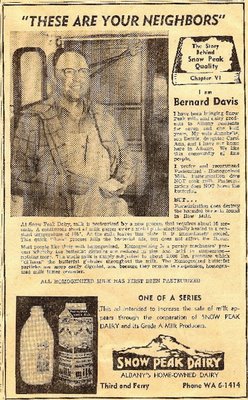 My granddaddy does. I just got this old, old newspaper ad for milk, featuring my dad's dad, Bernard L. Davis, a neighborly man who originally hailed from a dairy farm in Milwaukee, Wisconsin. This ad provides a clue as to where my father, Bernard E. Davis, might have inherited some of his love for all things dairy. Perhaps it also suggests why travelling with an emergency plastic spoon in his pocket for icecream became a necessity for Dad this summer, during our trip to the Philippines.
My granddaddy does. I just got this old, old newspaper ad for milk, featuring my dad's dad, Bernard L. Davis, a neighborly man who originally hailed from a dairy farm in Milwaukee, Wisconsin. This ad provides a clue as to where my father, Bernard E. Davis, might have inherited some of his love for all things dairy. Perhaps it also suggests why travelling with an emergency plastic spoon in his pocket for icecream became a necessity for Dad this summer, during our trip to the Philippines.







